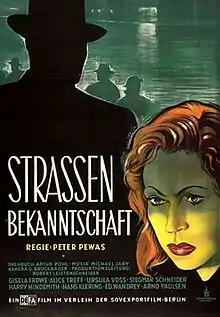Street Acquaintances
Street Acquaintances (German: Straßenbekanntschaft) is a 1948 German drama film directed by Peter Pewas and starring Gisela Trowe, Alice Treff and Ursula Voß. It was made by the Communist-controlled DEFA studios in the Soviet Zone of Germany Released in both the future West and East Germany it was a popular hit and sold 6,469,626 tickets.[1] While it can be regarded as using a style that resembled the Italian neorealist films of the era, it has also been suggested that it returns to the more traditional style of the Weimar era.[2] It portrays the dangers of spreading venereal disease.
| Street Acquaintances | |
|---|---|
 | |
| Directed by | Peter Pewas |
| Written by | Arthur Pohl |
| Starring | |
| Music by | Michael Jary |
| Cinematography | Georg Bruckbauer |
| Edited by | Johanna Meisel |
Production company | |
| Distributed by | Progress Film |
Release date |
|
Running time | 104 minutes |
| Country | Germany |
| Language | German |
It was shot at the Babelsberg Studios in Berlin and on location around the city. The film's sets were designed by the art director Wilhelm Depenau.
Cast
- Gisela Trowe as Erika
- Alice Treff as Annemie
- Ursula Voß as Marion
- Siegmar Schneider as Walter Helbig
- Harry Hindemith as Herbert Petzoldt
- Hans Klering as Peter
- Ursula Friese as Else
- Arno Paulsen as Elses Freund
- Gertrud Boll as Olly Gebauer
- Eduard Wandrey as Spitz
- Ursula Krieg as Frau Möbius
- Herwart Grosse as Arzt im Gesundheitsamt
- Agnes Windeck as Krankenschwester
- Marlise Ludwig as Erikas Mutter
- Eduard Wenck as Nachbar im Treppenhaus
- Lotte Loebinger
- Arthur Wiesner as Erikas Vater
- Walter Werner as Redakteur
- Karl Hannemann as Schieber
- Monika Bode as Ärztin im Chefarztzimmer
- Peter Elsholtz as Marions Freund
- Ernst Rotmund as Unangenehmer Zeitgenosse
- Karin Evans as Ärztin im Gesundheitsamt
- Ursula Kolmetz
- Otto Matthies as Nervöser Herr
- Werner Pledath as Praktischer Arzt
- Otto Brahn
- Axel Triebel as Ein alter Major
- Ellen Ysenta
- Werner Segtrop
References
- List of the 50 highest-grossing DEFA films.
- Moeller p. 23
Bibliography
- Martina Moeller. Rubble, Ruins and Romanticism: Visual Style, Narration and Identity in German Post-War Cinema. 2014.
This article is issued from Wikipedia. The text is licensed under Creative Commons - Attribution - Sharealike. Additional terms may apply for the media files.